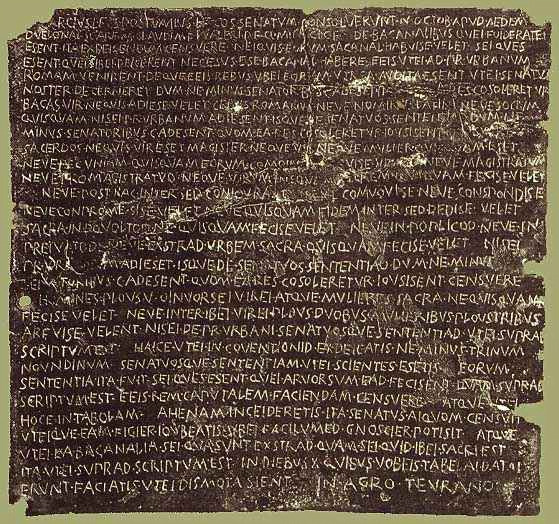Dionysus’s cult already been known in the second millenium BCE in the Minoan civilization. He was a god of opposites – kind and gentle, but also savage and cruel. He was broader known in the Romans as Bacchus. In 186 BCE was, connected with him, certain act, which remains unclear until today…
In various popular magazines can be found widespread thesis that in this act was some “religious ground”. That’s absurd! How can anyone persecute a god who can take a revenge on them, like Dionysus took a revenge on pirates who kidnapped him?
It’s the same case with the allegedly killed of thousands of young peoples; it’s highly controversial. Ancient sources don’t give us “statistics”, numbers given in them don’t reflect reality. Nobody counted them. Julius Caesar in Gallic War (Bellum Gallicum) has written that Gallic army counted a million soldiers; it’s absolutely impossible.
Against common opinions, in 186 BCE bacchanalia hasn’t been forbidden. The proof of that is even a quick reading of the resolution of the Senate concerning them, where it’s said only about the prohibition of creating associations and about limits of number of participants and demand of formal permission on the exercise of a cult from praetor urbanus.
Dates which can be encounter (16-17 march), which are allegedly the dates in which the bacchanalia has been celebrated suggest that it was an official festival recognized by Roman authorities included to the ritual calendar. The Bacchic cult of that period wasn’t an official cult, but an unofficial one – Livy gives us no premises to recognize of existence any official forms of this cult. Moreover, the ceremonies in honour of Bacchus were celebrated at night, which exclude any form of official cult. At the top of that, describing Hispala’s account he wrote that since Paculla Annia from Champaigne became the priestess highly increase frequently of ceremonies – devoted them 5 days in a month. This march’s date refers to Liberalia, which has nothing to do with bacchanalia, which is, unfortunately, incomprehensible for many of the people describing it. Liberalia is official state festival in honour of the old-Italian god Liber identified with Dionysus in 494 BC.
Very amused me such fragment found on the Internet:
Any informations about bacchanalia we’ve got only from fierce enemies of this cult. One of them was a Christian apologist Minuncius Felix Octavius lived in turn of II I III century CE:
They recognize one another by secret signs and marks; they fall in love almost before they are acquainted; everywhere they introduce a kind of religion of lust, a promiscuous ‘brotherhood’ and ‘sisterhood’ by which ordinary fornication, under cover of a hallowed name, is converted to incest. (…) An infant, cased in dough to deceive the unsuspecting, is placed beside the person to be initiated. The novice is thereupon induced to inflict what seem to be harmless blows upon the dough, and unintentionally the infant is killed by his unsuspecting blows; the blood – oh, horrible – they lap up greedily; the limbs they tear to pieces eagerly; (…)”
– The Loeb Classical Library, G.P. Goold (ed.), Tertulian, Apology, De spectaculis, Minucius Felix, Octavius, London 1977, p. 337, 339
Analysis of this fragment is highly educational, because it shows how ends not-reading quoting sources. The Author doesn’t know what is he quoting exactly whereby didn’t avoid horrible mistakes, completely mixing things. First of all: “Octavius” is the title of the work wrote by Minucius (not any Minuncius) Felix. Secondly, these are words one of the interlocutors (the work has a dialogue form), some Cicilius, which spoke that about Christians. It’s one of the classical spots (similar in Tertullian) accusing CHRISTIANS sacrificing infants, blood drinking etc.
Small mention about that act is in Cicero’s work, which allude about it in half a sentence. In treatise On laws he wrote:
Our ancestors’ severity on this subject is shown by the old resolution of the senate concerning Bacchanalia, along with the inquiry [and] chastisement by the consuls through the addition of military force.
– Cicero, On the Laws, trans. D. Fott, p. 181
Translation – of course – is not literal. In original we have:
Quo in genere severitatem maiorum senatus vetus auctoritas de Bacchanalibus et consulum exercitu adhibito quaestio animadversio que declarat.
– Oxford Classical Texts, J. G. F. Powell (ed.), M. Tulli Ciceronis, De Re Publica, De Legibus, Cato Maior de Senectute, Laelius de Amicitia
What has to be understood as:
Such kind of ancestor’s severity shows old resolution of the Senate about bacchanalia orders an action taken by consuls with a military force.
There is no informations, against any fakes, about 5-years persecutions, and even about persecution itself (only about “an action” – quaestio animadversio), and the use of military force is foggy. The army was command by consuls, which, according to resolution of the Senate, had to take the action. Perhaps that is why Cicero mentioned the military force. Without a doubt, the Roman orator was exaggerate.
All sources needs to be reading critically. The case of bacchanalia had only a political context and we know a little about it, however how would an army acted? Where? The Senate’s resolution (Senatus consultum de Bacchanalibus) was concerning an Italy (Roman allies – quī foederātī) not an entire Imperium Romanum. Moreover it didn’t forbid all the Bacchic cults as I already mentioned. Beside an army couldn’t enter to the Rome itself – it can’t cross pomerium (or pomoerium), that is to say the sacred border of the City.
The main account of the events of 186 BCE is the Livy’s account. We have there a vivid relations of crimes, killings and fornications allegedly committing by bacchants, especially on their secret meetings. Was it really like that? Rather not. Uncritical belief of Livy (and other written sources) is rather feature of XIX historiography. With Dionysus were linked, of course, very bloody miths contained motifs of tearing animals apart and even infants by bacchantes taken by ‘mania’ sent by a god; there were even acts of cannibalism. Walter F. Otto in his monograph about Dionysus writes wider about it. We shouldn’t however trust such miths; even Otto himself doesn’t do that, like Author of the second monograph about Dionysus, Prof. Lengauer, which presents more balanced description of Dionysus, not so bloody as the Otto’s one (They are both great experts of Greek religion). In the other hand, however, it is hardly not to see the familiarity to another event, the bloody suppression allegedly very dangerous antirepublic Second Catilinarian conspiracy by Cicero in 63 BC. The Catilina’s allies had to allegedly sacrifices humans to seal the enter to conspiracy (in such informations doubt a little Sallust, contemporary witness and the author of the historical work about this event, and takes it as a fact susceptible to belief in gossips Plutarch in Cicero’s life; with similar accusations we meet again in cases of Christians). Moreover, we have to remember that Livy writes in epoch of Augustus, when the justification have to be made of Principate and emphasize the merits to Rome of its maker (so Livy’s work is also an element of propaganda of the new regime). The stories of a great religious decline were made, which had to allegedly be common in the Republic, and be overcome by savior of the Roman state – the first Princeps Augustus, which appears to us as an restorer, which save the Republic from catastrophe, so, almost, create a New Rome – like Romulus. Colourful describes bacchic’s crimes we can treat as tales.
We should remember that in the beginnings of the II century BCE Rome is not an Italy! The Bacchic cult in Italy is present first of all in the Italian’s cities, mostly Greeks. And there were very popular indeed. The very interest testimony of that, concerning period and rank of spread this cult comes from Sophocles. In Antigone the choir is singing:
Thou by many names adored,
Child of Zeus the God of thunder,
Of a Theban bride the wonder,
Fair Italia’s guardian lord;
In the deep-embosomed glades
Of the Eleusinian Queen,
Haunt of revellers, men and maids,
Dionysus, thou art seen.– The Loeb Classical Library, T.E. Page (ed.), Sophocles, Oedipus The King, Oedipus at Colonus, Antigone, London 1962, p. 401
So we have a testimony that the Bacchic cult was widely spread in Italy already in V century BC. Why the Roman authorities became interested not until the beginnings II century BC? Moreover Livy has written that this “evil” was spreading from many years. No one knows nothing? People were vanishing without a trace and no one were looking for them? Hardly possible.
Great expert of Rome’s history, Prof. Ziółkowski, in his History of Rome, writes about this events (p. 272):
Horrible repressions which strike on the participants of bacchanals, were caused not gossips about ritual murders, poisonings and any kind of lust, but the main crime in the literally meaning of the word: broad spread of the cult and its organizing character, and also lack of any Republic’s administration and religion control over it.
Then he mentioned about illegal executions of the bacchants in Rome itself, which means that this “persecutions” had a folk lynch character of the incites by consul Postumius Albinus mob, supported by authority and agreement of the senate, which of course don’t deny the thesis that the disturbances were planned by the states authorities, but they didn’t have the character of the states persecutions. It was rather the state’s inspiring “social excess”.
The case had the clear political character – the cause of its execute was the existence of Rome’s state independent organization, not a religious regards.
Even if we belief in Livy’s account then his relation is clear – the subject of persecution was the improper rituals alien origin (externo ritu), which incompatibility with traditional Romans rites could disturb the balance between worlds of men and gods, that is the peace with gods (pax deorum). There were not persecutions caused by disbelief of bacchants of “the one and true god”. In the times of Livy Dionysus was widely known, respectable and accepted god (which explains also the horror of – according to Livy – the deeds of bacchants – somehow he must convinced his readers about the dangerous justifying the persecutions). Clearly states it Prof. Musiał:
Dionysus played on the Tibr in the end of the I century BCE much bigger part then it results from written sources.
I hope I managed to shed some light on this, very unclear up to this day, case. Dionysus was very curious god, many elements of his “theology” were borrow by Christians. It was describe in, already mentioned by me, work about Dionysus (pos. 2 in bibliography) by Prof. Włodzimierz Lengauer, great expert of both Greek religion and Dionysus itself.









